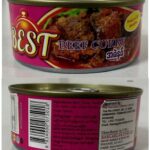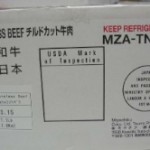The USDA has issued a public health alert f0r meat and poultry products that were illegally imported from the country of Myanmar. That country is not allowed to import these products into the United States. There have been no confirmed reports of adverse reactions reported to date. These items include: 180 gram cans containing “BEST BEEF CURRY.” 425 gram cans containing “BEST Chicken Biryani.” 360 gram cans containing “Hti Mi Gwik Dry MoHinGa Paste.” 425 gram cans containing “BEST Myanmar Duck Blood.” 400 gram cans containing “Eain Chak MoHinGa Paste.” 160 gram vacuum sealed clear packages containing “Min Thar Gyi Dried Fish.” 400 gram cans containing “Eain Chak Coconut Soup Paste.” These items do not have an establishment number or a USDA mark of inspection. … [Read more...]
FDA Plans to Modernize Oversight of Imported Food
The FDA's Commissioner Dr. Scott Gottlieb and Deputy Commissioner Frank Yiannas are announcing a new strategy to modernizing government oversight of imported food. This country imports about 15% of its food supply from more than 200 countries or territories around the world. Other countries supply 32% of our fresh vegetables, 55% of fresh fruit, and 94% of our seafood. And there have been quite a few food poisoning outbreaks linked to imported food in the past few years. Last year, a Salmonella Concord outbreak was linked to tahini imported from Israel. In 2017, a Salmonella outbreak linked to papayas imported from Mexico sickened at least 255 people with nine different strains of the pathogen. And in 2016, almost a thousand people were sickened across the country with Salmonella … [Read more...]
Imported Foods Most Often Rejected: Seafood, Veggies, and Fruit
The USDA has released a report detailing the foods the Food and Drug Administration (FDA) most often rejects at our nation's ports for problems. They are seafood/fish products, vegetables/vegetable products, and fruit/fruit products. The countries that have the most shipments refused are Mexico, India, and China. Data for this report was analyzed over the years 2005 to 2013 and was compared to data from the years 1998 to 2004. In addition, refusals of spices, flavors, and salts doubled between 1998 to 2004 and 2005 to 2013. The FDA only inspects about 1% of the 60,000,000 tons of food imported into this country every year. Inspectors target certain facilities and firms and certain types of products that have a higher risk for pathogenic bacterial contamination or other type of … [Read more...]
FDA Begins Testing Cucumbers and Hot Peppers
The FDA is ramping up testing of cucumbers and hot peppers, after six reports of food poisoning outbreaks linked to cucumbers from 1996 to this year. Those foods are eaten raw, and they are often contaminated. Produce can be contaminated in several ways. It can come into contact with polluted water, or dirty equipment during growing, harvesting, and post-harvest production. Ill workers who harvest and sort the produce by hand can also contaminate it. The government is seeking information on the prevalence of Salmonella and E. coli O157:H76 on fresh cucumbers. There is currently a Salmonella outbreak linked to slicer cucumbers imported from Mexico by Andrew & Williamson Fresh Produce. The CDC reports that 838 people in 38 states have been sickened in the past two months. Fresh … [Read more...]
Consumer Reports Calls for FDA to Increase Tests on Imported Shrimp
After conducting a study that found antibiotics, which are illegal in shrimp farming, and bacteria that cause food poisoning on imported shrimp, Consumer Reports is calling on the U.S. Food and Drug Administration (FDA) to step up testing. The consumer watchdog wants Congress to increase funding to the FDA so it can inspect and test more imported shrimp and keep tainted products out of the foods supply. Americans eat more shrimp than tuna, consuming more than 18 million servings each day. Most of it, 94 percent, is imported from farms in Indonesia, Thailand and India. And most of it, 96 percent, is not inspected. Consumer Reports purchased 342 packages of frozen raw and cooked shrimp from grocery stores, natural food stores and discount food clubs in 27 cities. Those stores include … [Read more...]
Imported Beef Products Recalled for Lack of Inspection
ATM International is recalling about 1,999 pounds of boneless beef products that were not presented at the border for inspection. Without the benefit of full inspection, a possibility of adverse health consequences exists. No illnesses have been reported to date. The recalled products are various weights and cuts of vacuum packed chilled boneless beef imported from Japan. They were labeled in Japanese only. The translations of the cuts include tender loin, strip loin, ribeye, chuck roll, top sirloin butt, chuck ribs, bottom round, top round, clod, brisket, short plate, short rib, and knuckle. They were shipped inside a cardboard box with the Japanese establishment number "M2" and a box marking of “MZA-TN41”, “MZA-TN28” or “MZA-TN1” or inside of a Styrofoam box bearing the establishment … [Read more...]
Recalled Imported Pork Highlights Problems with TPP
Food & Water Watch has sent a letter to USDA Secretary Tom Vilsack, stating that the recent recall of 170,000 pounds of imported pork and nine other recent recalls highlights the fact that the Trans Atlantic Trade Partnership (TPP) and the Transatlantic Trade and Investment Partnership agreements may be flawed and problematic for food safety concerns. Both of those agreements would expedite food imports into the United States from other countries. That recall this month was for pork from Denmark. The meat was not presented at the U.S. point of entry for inspection as the law requires. Food & Water Watch wrote to USDA about this problem last year, but states "the problem seems to be getting worse." USDA claims that the Public Health Information System (PHIS) and Customs and … [Read more...]
USDA Should Protect Consumers from Australian Meat
Food & Water Watch sent a letter to the USDA to protect U.S. consumers from Australian meat and to re-evaluate the equivalency of that country's meat inspection system. Meat companies are abandoning the Australian Meat Inspeciton System (AEMIS) that was found to be equivalent to the U.S. system. This is the fifth time in two years that Food & Water Watch has asked the USDA to look at the Australian food safety inspection system. Food & Water Watch's executive director Wenonah Hauter said in a statement, "Although the European Union has flagged definite problems in allowing meat companies to police their own inspection systems, the USDA has yet to speak out about this every obvious conflict of interest. Yet if the result of a privatized meat inspection system in Australia is … [Read more...]
Food & Water Watch Responds to FDA Pet Jerky Investigation
Food & Water Watch has responded to the latest information released by the FDA about their investigation into the pet deaths and illnesses linked to jerky treats imported from China. Wenonah Hauter, executive director of the agency said in a statement, "this ongoing health threat to American pets illustrates how trade policy is trumping regulations to protect our health. When is the Obama administration going to show some backbone and stop the importation of these deadly products until we have some concrete answers?" At least 4,800 pets have been sickened by these imported products. At least 1,000 dogs have died as a result of their illness. The FDA does n0t have any answers, despite a lengthy investigation. The jerky treats are made from chicken, duck, or sweet potato. Some … [Read more...]
FDA Issues Final Guidance for Import Refusal of Ackee
The FDA has issued final guidance on import enforcement for ackee, a fruit that contains the toxin hypoglycin A. When the fruit is fully ripe, the toxin drops to negligible levels, but if the fruit isn't ripe or if it isn't properly processed to remove the seeds and rind, concentrations of hypoglycin A can rise about 100 parts per million and become a health risk. The FDA now has the authority to seize domestic product and to refuse imports. Ackee is a tropical fruit about four inches long. When immature, it is green. A mature fruit is yellow, with an overlay of bright red with three bulging seams. The fleshy, pale yellow arils inside are the edible part. Ackee is found in West Africa, South America, Central America, and the Caribbean. It is also found in Florida. The fruit is … [Read more...]













